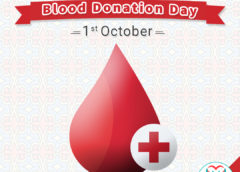On 1 October each year, National Voluntary Blood Donation Day is celebrated in India to highlight the need and value of blood in an individual’s life. It was first celebrated by the Indian Society of Blood Transfusion and Immunology on October 1, 1975.
On 22 October 1971, under the leadership of Mrs. K., the Indian Society of Blood Transfusion and Immunology was recognized Dr. J.G.Jolly and Swarup Krishen
Every state in India organizes a number of awareness campaigns, camps, and activities on the National Voluntary Blood Donation Day to make people aware of the donation of blood. We also included a rundown of all the required details in this article that one should know before engaging in the blood donation program.
We also recognize that people differ in the form of blood they hold. The blood of a donor should match the blood of the recipient during a blood transfusion. So, in order to partake in the Voluntary Blood Donation scheme, you should have a good knowledge of your blood type.
Blood donation is really beneficial for all healthy people and is a must. The person who donates blood is willing to save the life of the person in need. The key aim for this day is to inform the general public all over the world about the meaning and function of blood donation and how a person can willingly donate blood to fulfill the needs of the people. In the new health care system, exchanging or giving blood or components of it to the poor has become an integral part of society. Who is the bloodline or recipient it doesn’t matter. Not only can you donate blood to your family or mates, but you should donate blood to another human being willing.
It may facilitate people living longer and enjoying a greater quality of life who suffer from life-threatening conditions.
If human struggles for his or her life and needs blood, no specialized technology, supplies, or medication can help. For blood, there is no alternative. It cannot be created or substituted. Only by another human being will it be obtained. Nothing can be better than saving someone’s life with the healthy body one has been given with.
Read Also: Why is AB negative blood so important?
The main objectives of National Voluntary Blood Donation Day
- To inspire those donors who only donate blood to their families or friends to donate on a regular basis.
- To raise awareness among individuals of the value of the voluntary donation of blood.
- To give our thanks and strengthen the self-esteem of those who regularly donate blood, so that they continue to do so on a regular basis.
- To inspire those who have not contributed blood, but are in good health, to continue to donate blood.
- To reach 100% voluntary blood donation in order to be able to give the vulnerable people the finest blood.
- To have ample blood supply for any eventuality in our blood banks.
Importance of National Voluntary Blood Donation Day
Blood is a crucial part of human life since it supplies the tissues and organs of the body with necessary nourishment. National Voluntary Blood Donation Day is celebrated to bring about the great changes in culture and follow life-saving steps and avoid severe illness caused by abuse and disease, problems involved with childbirth, road traffic collisions, and many other circumstances.
Read ALso: O positive blood type
Every year, safe blood donors save many lives of all ages and from all walks of life. Countries such as Tripura, Tamil Nadu, West Bengal, and Maharashtra are deemed volunteer blood donors at the national level. Tripura, the country’s North Eastern District, is considered to be India’s highest voluntary blood donation rating (93 percent), whereas Manipur is considered to be the country’s lowest.
To eradicate the ignorance, distrust, and stereotypes of the general public about the voluntary blood donation campaign, it is important to celebrate this day to a great degree. In order to promote students/youth, schools, organizations, clubs / NGOs, and so on, voluntary organizations of the nation spend their precious time and use their services.
Who Can Donate Blood?
There are some criteria for blood donor according to the Drugs and Cosmetics Act 1940. Which are given below:
- Age should be from 18-60 years
- Weight should be minimum 45 kg
- Pulse Rateshould be 60-100 per minute
- Normal blood pressure
- Hemoglobin should be5 gm.
- Body Temperature should be5-degree centigrade
Celebration/Activities Perform
National Voluntary Blood Donation Day is celebrated all over India with great enthusiasm. Today is the day for giving blood and encouraging people to do so.
On this day, in virtually all government schools, an additional class is held in which children are presented with all the information relevant to blood donation, such as what blood donation is, its cause, its advantages, and its process, etc.
On this day, numerous government and private organizations and NGOs are launching an awareness drive to raise awareness among ordinary citizens about blood donation and encourage them to do so.
On this day, medical institutions and hospitals run blood donation programs, where any person can simply go and donate blood and can contribute to this mission. Data on blood donation is shown every day in the print media, social media, TV, and radio. Those who donate blood are then rewarded so that they feel good and people will come forward and assist in this as well.

Leave a Reply
You must be logged in to post a comment.